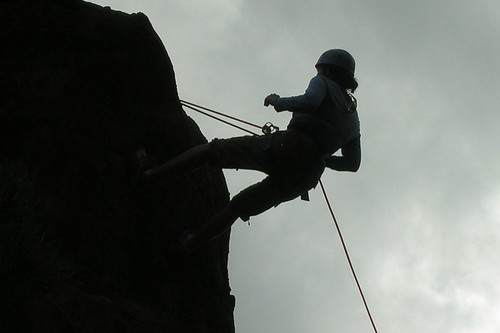You know those people into webinars who dial in from overseas at ungodly hours... that was me today, hosting a 4pm EDT webinar at 5am from Singapore. We were lucky to host Angela Maiers, who is coming this March to keynote the MassCUE/METAA Leadership Conference, and our conversation was about Angela's campaign to promote Passion Driven Learning. (The webinar recording can be viewed here)
So to begin with Passion-Driven learning requires some definitions, since Angela doesn't use the term as it commonly occurs in educational discourse. It's not really about encouraging individual children to follow their passions so much as inspiring a group with a cause or a mission--a cause so important that students are willing to, in the words of Robert Service, "suffered, starved and triumphed,/groveled down, yet grasped at glory,/Grown bigger in the bigness of the whole?"
Passion Driven Learning might also be called service driven learning or cause driven learning. Angela highlights the roots of the word passion in suffering-- that students need to want to do something so bad that they are willing to work and suffering in learning to achieve their goals. She shared a variety of examples, mostly in elementary schools, of students working on project to promote global reading or eliminate child trafficking that compelled them to research, read, write, produce media, and so forth.These causes/passions are sufficiently compelling that they motivate not just individual students, but whole groups. Student bring forth their genius because it is needed. To quote another great outdoorsman, Kurt Hahn: There are three ways of trying to win the young. You can preach at them—that is a hook without a worm. You can say, "You must volunteer"—that is of the devil. And you can tell them, "You are needed"—that appeal hardly ever fails.
Angela's talk brought up two connections for me. The first was to the work of Ken Bain, on What the Best College Teachers Do, in my mind an undervalued book in education. One of Bain's core observations is that the best college teachers task students with questions that compel students to find answers and challenges that demand solving. These teachers pose puzzles that get under peoples skin, and enliven them. For Angela, these challenges have a strong connection to service (or at least did in this webinar). In my own teaching, I think that challenges that compel learning can also be sourced from the great intellectual questions of our disciplines (I wrote about this here).
 The second connection was to teaching young people to travel in the wilderness. My friend Shawn Benjamin taught many years for NOLS in Alaska and Patagonia. Her style was to time teaching to need. She taught people how to repel at the top of a cliff that lacked alternative routes for descent. When there is only one way down in the middle of a Patagonian wilderness, you learn how to rappel quite quickly. That is perhaps somewhat different than a passion but has this correlation, we get the best of our students when we challenge them with great needs, compelling problems, and powerful questions.
The second connection was to teaching young people to travel in the wilderness. My friend Shawn Benjamin taught many years for NOLS in Alaska and Patagonia. Her style was to time teaching to need. She taught people how to repel at the top of a cliff that lacked alternative routes for descent. When there is only one way down in the middle of a Patagonian wilderness, you learn how to rappel quite quickly. That is perhaps somewhat different than a passion but has this correlation, we get the best of our students when we challenge them with great needs, compelling problems, and powerful questions.
Many thanks to Angela for her time and insight, and I look forward to meeting her in person at MassCUE.